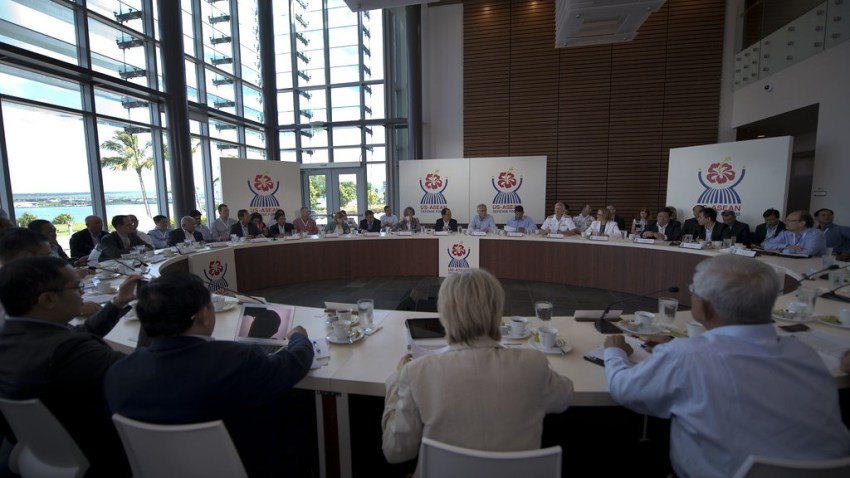U.S. Defense Secretary Chuck Hagel hosted defense ministers from 10 ASEAN members last week. The informal meeting in Hawaii was the first of its kind, and it came at a time when the United States is trying to build the partnerships necessary for its Asia rebalance strategy.
Ian Storey of the Institute of Southeast Asian Studies in Singapore explains in an email that while ASEAN defense ministers have previously met with their U.S. and Chinese counterparts, last week’s meeting was “the first time they have done so outside the region.” A meeting between ASEAN defense ministers and the Chinese defense minister is also likely in the near future, he says, as ASEAN states seek to “balance” their relations with the United States and China.
According to Patrick Cronin of the Center for a New American Security, the meeting “demonstrated a mutual desire for the United States to remain actively engaged in regional security,” including through information-sharing and common practices for dealing with natural disasters and other contingencies. It enabled Hagel to have “broad-based discussions” with his Southeast Asian counterparts and to “encourage them to keep building ASEAN’s capacity as a regional institution,” Cronin says.
Further, the meeting underscored the U.S. commitment to an “inclusive, rules-based system and architecture that condemns the attempts to settle disputes by coercion or force,” Cronin says. This includes encouraging ASEAN states to support one another in pursuing international arbitration of disputes with China in the South China Sea.
The talks gave the Obama administration an opportunity to lay out its view of the particular security challenges facing Southeast Asia, which go beyond commonly discussed threats like terrorism and the potential for state-on-state conflict. Accordingly, the conference featured presentations on humanitarian assistance and disaster relief from U.S. Agency for International Development Administrator Rajiv Shah, as well as a visit to a National Oceanic and Atmospheric Administration “tsunami-threat and detection facility.”
The administration also focused on one of its top priorities: climate change. In a blog post on the White House website describing the meeting, influential Obama adviser John Podesta wrote that ASEAN members are among those “expected to face some of the worst effects of climate change.” As a result,
he wrote, the United States and partner nations need to “identify how our militaries can work together more effectively to tackle nontraditional security challenges, including climate change and natural disasters.”
Linking the meeting in Hawaii to language in the administration’s 2014 Quadrennial Defense Review, Podesta wrote that “climate change is not just an environmental problem; it’s an economic and security problem as well.”
Although last week’s discussions appeared directed in part at managing China’s rise, Hagel attempted to downplay tensions with China, which he visited earlier this week. He emphasized that “the rebalance to Asia-Pacific was not a contain China strategy.” To the contrary, Hagel said, “this was a continuation of the relationships, the friendships, the partnerships that we've had for many years with many of these countries in Asia-Pacific.”
During his time in China, Hagel became the first foreign defense official to tour China’s sole aircraft carrier. The visit included a meeting with Vice Chairman of the Chinese Central Committee Gen. Fan Changlong, in which Hagel
expressed his appreciation for “the chance to build towards a new model of military-to-military relations,” according to a readout from Pentagon Press Secretary John Kirby.
In tandem with the United States’ efforts to strengthen its security commitment to Southeast Asia, the U.S. is also pursuing final negotiation of the Trans-Pacific Partnership (TPP) with several ASEAN members. Although the Obama administration has publicly articulated a commitment to TPP on a number of occasions, Congress has expressed reluctance about granting the administration trade promotion authority (TPA), or “fast track” authority, widely
seen as a requirement for a successful final negotiation. With TPA, Congress forgoes the ability to offer amendments to trade agreements, making the president a more credible negotiating partner.
In remarks this morning in Washington, Sen. Orrin Hatch, the ranking Republican member of the Senate Finance Committee and a TPP supporter, spoke about the barriers within the U.S. political system to the granting of TPA. “Today the Obama administration is undertaking comprehensive trade negotiations around the world without the authority of Congress,” he said. Accordingly, final conclusion and implementation of the TPP “is on shaky ground.”
“No complex, economically significant trade agreement has ever been negotiated—by any administration—and approved by Congress, without trade promotion authority,” he explained.
Hatch criticized the administration’s “anemic” efforts to obtain TPA, attributing it in part to opposition from labor groups, and discussed his own efforts to provide objective standards based on which Congress would approve TPA for future free trade agreements. These include measures on intellectual property, currency practices and the environment.
But even if the administration can boost relationships in Southeast Asia through trade, the U.S. defense posture in the region is a priority. As many observers of U.S. policy in Asia worry about the ability of a declining U.S. defense budget to fund a meaningful “pivot,” this will increase the need to rely on partner cooperation and capacity. If Hagel’s discussions with ASEAN states are an indication that such cooperation is forthcoming, the Obama administration’s task will be that much easier.

